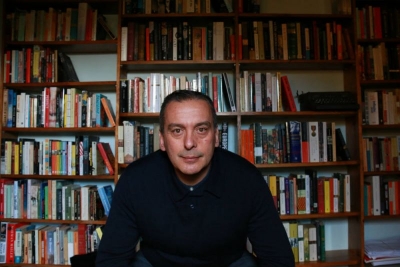Accessibility Tools
- Content scaling 100%
- Font size 100%
- Line height 100%
- Letter spacing 100%
Archive
The ABR Podcast
Released every Thursday, the ABR podcast features our finest reviews, poetry, fiction, interviews, and commentary.
Subscribe via iTunes, Stitcher, Google, or Spotify, or search for ‘The ABR Podcast’ on your favourite podcast app.
‘Where is Nancy?’ Paradoxes in the pursuit of freedom
by Marilyn Lake
This week on The ABR Podcast, Marilyn Lake reviews The Art of Power: My story as America’s first woman Speaker of the House by Nancy Pelosi. The Art of Power, explains Lake, tells how Pelosi, ‘a mother of five and a housewife from California’, became the first woman Speaker of the United States House of Representatives. Marilyn Lake is a Professorial Fellow at the University of Melbourne. Listen to Marilyn Lake’s ‘Where is Nancy?’ Paradoxes in the pursuit of freedom’, published in the November issue of ABR.
Recent episodes:
Christos Tsiolkas, author of Loaded, is a 29-year-old gay, Greek-Australian who lives in Melbourne. His essays, journalism, and reviews have appeared in the gay press, ethnic press, student, and left-wing journals.
... (read more)I’ve told this story before, but perhaps I might give it one last run ... There I was at a NSW Premier’s Literary Award dinner, giving the annual address and I wanted to say, in passing, that much verse and most fiction, like most of anything else, are more likely to be products of imitation than of imagination. On the other hand, essays, history, philosophy, prose sketches, social, political and cultural analysis, popularisations of specialist scholarly stuff and all kinds of criticism can at times be more imaginative than verse or fiction – and display greater literary qualities.
... (read more)From 1994 two letters to the editor published now for the first time ... The first letter, from Helen Demidenko, was offered for publication; the second, from B. Wongar author of Roki was marked ‘not for publication’.
... (read more)From Paul Salzman
Dear Editor,
It is a shame that allegations of plagiarism in The Hand That Signed The Paper were trivialised into questions of literary echoes that would certainly not have worried any serious member of that curious entity, the literary community. As someone deeply troubled by the anti-Semitism manifested in the novel, I have been interested to know where the Ukrainian material that ‘Demidenko’ defended as family history may have come from. Perhaps we will never know, but now it seems that the plagiarism issue was really something of a red herring, distracting attention from what was most disturbing about the novel and its attendant prizes. I cannot see that ‘postmodemism’, under any definition, could be blamed for this situation, given that the Miles Franklin judgment is based, I believe, on a bankrupt and outmoded humanism that sees abstract moral truth in literary works without having any sophisticated regard for politics or history.
... (read more)At Home in the World by Michael Jackson & The Survival Dreaming by Peter McCloy
The Death of William Gooch: A history’s anthropology by Greg Dening
A Radical Tory: Garfield Berwick’s reflections and recollections by Garfield Barwick
In Sydney last month, Barry Kosky’s production of Verdi’s Nabucco was booed by a section of its first-night audience, a unique occurrence, this, at the Australian Opera, but one that Kosky took in good part as an extension of the ‘playful’ side of the evening’s events.
... (read more)Have you noticed what’s happened to the daiquiri? It’s been reinvented, by the Teen Literati. Now it doesn’t seem fair to blame the Industrial Revolution for what happened to the daiquiri, or to Writing in Australia in the 1990s, but the Industrial Revolution started it – you know, the steam engine, World Wars, radiation poisoning, filter-tipped cigarettes, Mickey Mouse, germ-free hamburgers, and air travel holidays for the working family. And the Industrial Revolution was kick-started by the bourgeoisie. That’s right: you people, the middle class.
... (read more)





